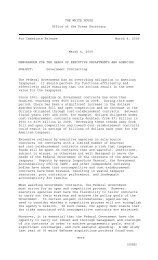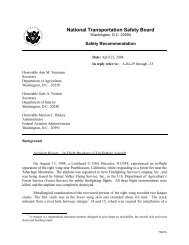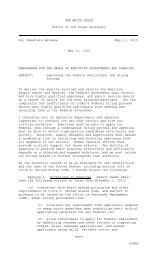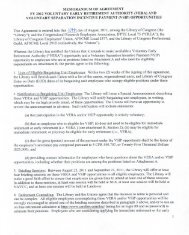Accenture's fifth annual global e-government study
Accenture's fifth annual global e-government study
Accenture's fifth annual global e-government study
Create successful ePaper yourself
Turn your PDF publications into a flip-book with our unique Google optimized e-Paper software.
Appendix—research<br />
methodologies<br />
Quantitative online service<br />
assessments<br />
We have maintained the foundation of our research—<br />
a quantitative assessment of the quality and maturity<br />
of services for both citizens and businesses available<br />
through national <strong>government</strong> agencies’ websites.<br />
However, we have included additional services this<br />
year, increasing the total from 201 to 206.<br />
Behaving as citizens and businesses, Accenture<br />
researchers in 22 selected countries used the Internet<br />
in an attempt to fulfill service needs that might typically<br />
be provided by a national <strong>government</strong>. They<br />
accessed and assessed the websites of national<br />
<strong>government</strong> agencies to determine the quality and<br />
maturity of services, and the level at which business<br />
can be conducted electronically with <strong>government</strong>.<br />
The research was carried out during a two-week<br />
period between January 7 and January 23, 2004.<br />
Accenture selected 22 <strong>government</strong>s for the <strong>study</strong>:<br />
Australia, Belgium, Brazil, Canada, Denmark, Finland,<br />
France, Germany, Ireland, Italy, Japan, Malaysia,<br />
Mexico, the Netherlands, Norway, Portugal, Singapore,<br />
South Africa, Spain, Sweden, the United Kingdom<br />
and the United States. In total, 206 national<br />
<strong>government</strong> services across 12 major service sectors<br />
were investigated. The 12 service sectors researched<br />
were agriculture; defense; eDemocracy; education;<br />
human services; immigration, justice and security;<br />
postal; procurement; regulation; participation;<br />
revenue and customs; and transport.<br />
The services surveyed were representative of what<br />
citizens and businesses require from their <strong>government</strong><br />
most frequently. The services were traditionally<br />
offered over the counter, by phone or in paper format.<br />
No <strong>government</strong> surveyed offered all 206 services<br />
at the national level. In most countries, aspects of<br />
many of the services are offered at a lower tier of<br />
<strong>government</strong>—examples of which include state,<br />
regional, municipal and county. For example, education<br />
services in Canada are the responsibility of the<br />
provinces and are therefore outside the scope of the<br />
<strong>study</strong> in that country. We confined our search to<br />
central <strong>government</strong>s to provide a common base for<br />
comparison for the rankings section. In instances<br />
where services are delivered at a state, local or<br />
regional level, these services were removed before<br />
the analysis was undertaken for a country and the<br />
<strong>government</strong> concerned was in no way penalized.<br />
106













